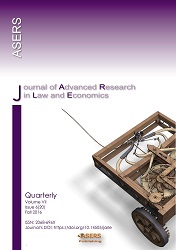Legal Aspects of Customs Activity in the Framework of the EAEC
Legal Aspects of Customs Activity in the Framework of the EAEC
Author(s): Maryam Dossymbekova, Akif Firudinovich SULEIMANOV, Kyzgaldak Baizhanova, Gulmyra Saduakacovna Kalieva, Meruert Oraltaevna MUKAZHANOVASubject(s): Law, Constitution, Jurisprudence, Law on Economics
Published by: ASERS Publishing
Keywords: customs factor; union; education; documents regulation;
Summary/Abstract: Over the considered steps mechanism customs regulations of the Customs, and then the Eurasian Economic Union has evolved and acquired a certain resemblance to the same mechanisms that exist in most developed countries. At the same time the modern mechanism of customs regulation of foreign trade activities EAEC issignificantly different for the projects impact on the mechanisms used by most of the countries with an open market economy, which is largely a consequence of the ‘pendulum’ fluctuations of foreign economic policy of the Member States EAEC of liberalization to protectionism, timing differences of formation measures state regulation of foreign economic sphere, inconsistent implementation of the customs control measures, accumulated over the years of reform the complex contradictions between the state of the external economic complex and the mechanism of customs regulation of foreign trade activities, underestimating the negative aspects of joining the WTO. Despite the fact that the legislation of the EAEC contains all the main foreign trade regulation instruments used in leading foreign countries, for the practical application of many of them it was not created the necessary institutional, informational, technical, human resources base at the national level. Customs regulation of foreign trade activities in the Member States EAEC is not advancing and catching character, it is a reaction to the destabilization of the foreign economic sphere, that does not allow effective use of this mechanism in the implementation of the strategic priorities of the external economic complex. The current state of the mechanism of customs regulation of foreign trade activities EAEC does not match its potential, is not conducive to prevent counterproductive asymmetry between the structure of exports and imports of goods, which ultimately affects the possibilities of enhancing the quality of life and economic growth,leading to a failure in conditions of aggravated international pressure to support the domestic industry, foreign direct investment, the improvement of the trade balance. At the present stage of economic reforms are particularly important concerted efforts of Member States EAEC on regulatory, institutional, economic,informational support of the modernization of customs regulation of foreign trade mechanism EAEC. Taking into account all the complex factors determining the status and prospects of development of foreign economic systems of the Member States EAEC obvious need for urgent steps towards a holistic mechanism of customs regulation of foreign trade activities that will prevent losses and risks associated with the adaptation of the Member States to the new, as yet imperfect conditions EAEC operation and participation in the WTO, including the possible increase in transaction costs of participants of foreign trade activities, infringing the interests of certain groups of domestic producers, intergovernmental overflow of funds, ‘overflow’ of trade flows to countries with lower customs costs. New challenges facing the Member States EAEC require efficient use of adaptive capabilities of customs regulation mechanism of foreign trade, which allows on the basis of comprehensive operational analysis to develop plans for preventive measures of customs regulation, to find effective strategies to incorporate the Russian participants of foreign economic activity in the global economic system and, in the final finally, to ensure the implementation of national interests in foreign economic sphere.
Journal: Journal of Advanced Research in Law and Economics (JARLE)
- Issue Year: VII/2016
- Issue No: 20
- Page Range: 1346-1361
- Page Count: 16
- Language: English
- Content File-PDF

